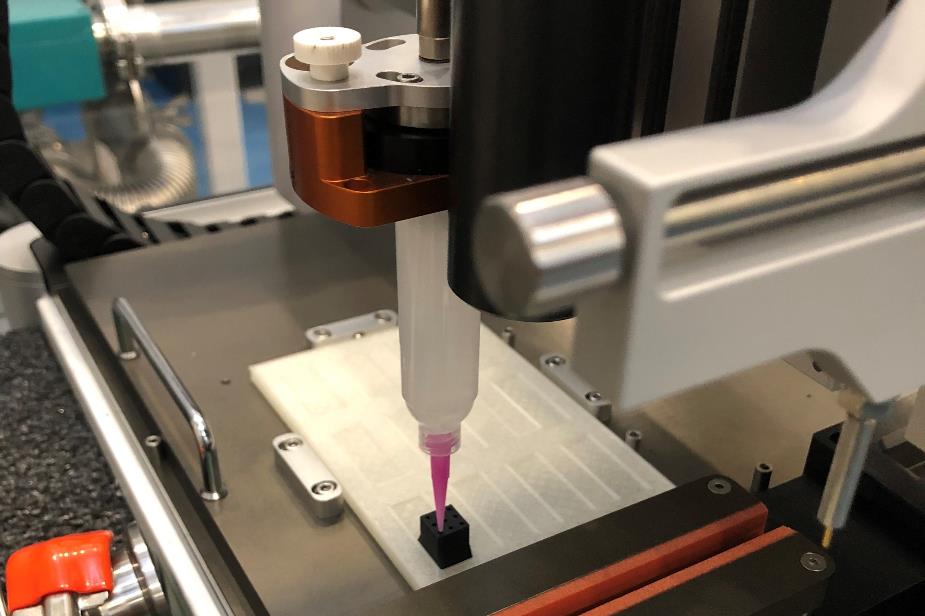Sara is going to earn her PhD on solid transitions between hard and soft materials
25 March 2022
In the next five years, lecturer-researcher Sara Panahkhahi will focus on the connections between hard and soft materials. She was recently awarded a PhD scholarship by NWO and from now on will dedicate as much time as...

In the next five years, lecturer-researcher Sara Panahkhahi will focus on the connections between hard and soft materials. She was recently awarded a PhD scholarship by NWO and from now on will dedicate as much time as possible to teaching and researching. This means conducting research on hard-soft interfaces. For example, take your mobile phone charger and reflect on the transition from the soft cord to the hard shell that it disappears into. These are the type of vulnerable connections that are at stake. We see them in many places and many disciplines: in robot fingers, implants and exoskeletons, but also in cars and aeroplanes.
Fragile connections
Sara and her colleagues at TU Delft are looking for ways to build more robust connections. It’s a challenge for sure. Sara: ‘Whenever materials with different mechanical properties come together, we find a high concentration of stresses. This is especially true during dynamic loading, but also during static loading. This is precisely why a connection between hard and soft materials easily comes apart. This logically generates problems and extra costs.’ Getting rid of these connections is not an option, so we must improve them.
Nature as a source of inspiration
When researching materials, Sara loves being inspired by nature. Hard-soft connections also occur in the human body for instance. So in the near future she will study the knee joint extensively. After all, cartilage and bone cooperate so well there that this large joint can easily last 60 to 70 years with an average load. Snails have also caught Sara's interest. ‘Why doesn't a snail lose its shell?’
You can even print human tissue with a 3D-bioprinter
Advanced 3D printing techniques
It also has to be feasible to create these ideal compounds, of course. Sara's research project will also look into that aspect: ‘Because we get our inspiration from nature, we are dealing with complicated structures by definition. The only way to achieve this is by using a 3D multi-material printer or a 3D bio-printer. With the latter, you can even print human tissue.’ On her research days, Sara can experiment to her heart’s content in the different labs of the Biomedical Engineering Department at TU Delft.
Students benefit as well
And if she finds a way to increase the longevity of your charger, she will have achieved her goal. However, this will involve five years of literature study and countless tests. In the meantime, she allows our Mechanical Engineering students to take part in her PhD project. By making test set-ups with them, preparing experiments and then implementing these. Interested trainees and graduates can also apply to work with her eventually.
Involving students in my research project is
required by the NWO
A benefit to the degree programme
‘In my material science and production technology classes, I share the knowledge I acquire," Sara explains. ‘NWO even requires that I teach a minimum of two days and involve students in my research. Whatever I learn, about the research method or any specific content, I must pass it on to students. And I am sure that my manager would not have signed off on this project if I had a different perspective on this. The degree programme also has to benefit from it.’ The idea is to build such a network in the coming years that she can develop a minor.
As a girl, she was already interested in two fields
How did Sara come up with this research theme? ‘Technology and medicine have always been two main interests of mine. When I was in primary school in Iran, I already knew that I wanted to do something in the medical field. I was also good in maths and physics and ended up more or less blindly embracing the bachelor's degree in Mechanical Engineering. That was fine, especially when I did a minor in Biomedical Engineering. During my master's internship, I set up a project with implants.’ She decided she wanted to continue in this field, but it didn't immediately work out.
Professor Zadpoor's group
Sara: ‘I got that opportunity when I joined TIS. I started looking for opportunities to do research in that area and I discovered professor Zadpoor's group at TU Delft. The group works with biomaterials and does excellent work. And the combination of technology and health is exactly my kind of thing. When I read something about an artificial heart, I have to know every detail about it, haha.’
Read more about the Technology for Health Research group
Read more about the degree programme Mechanical Engineering at The Hague University of Applied Sciences